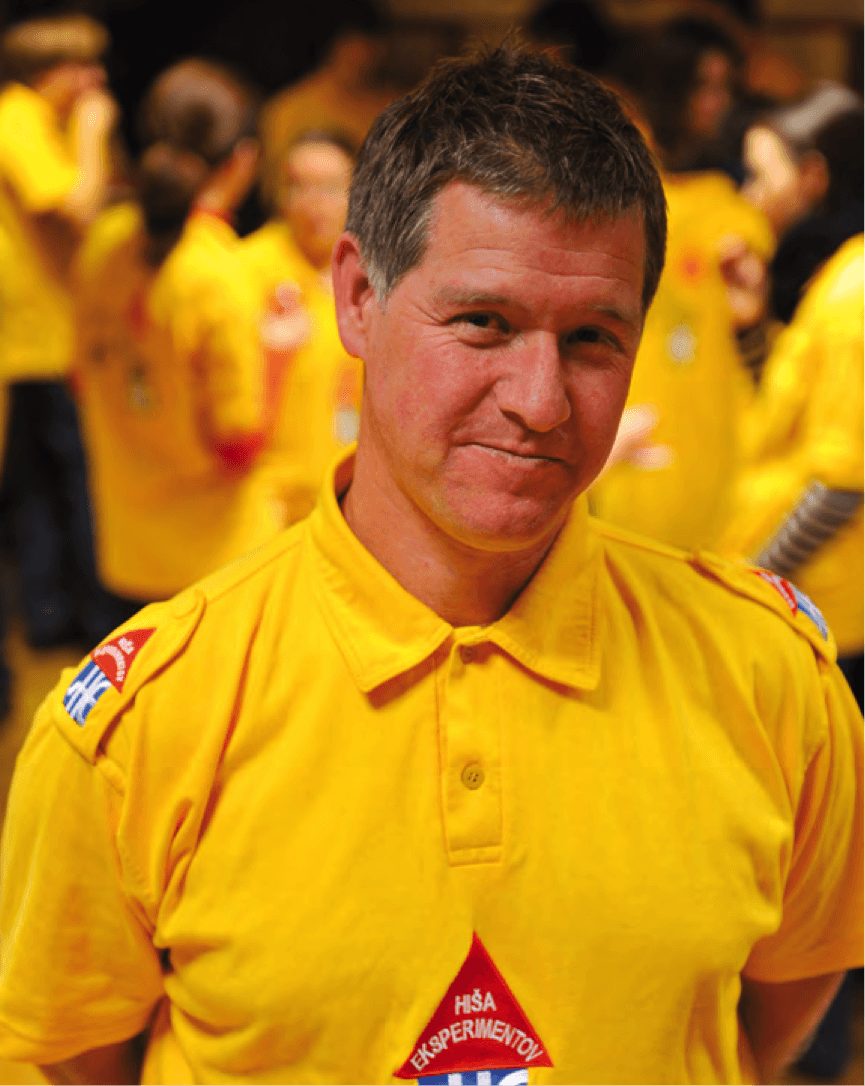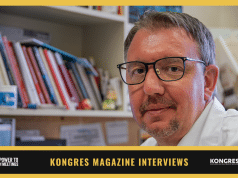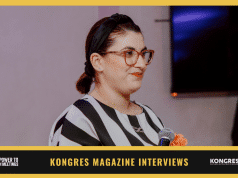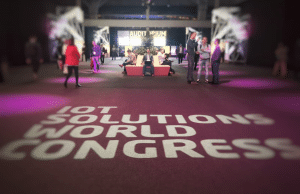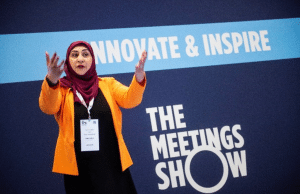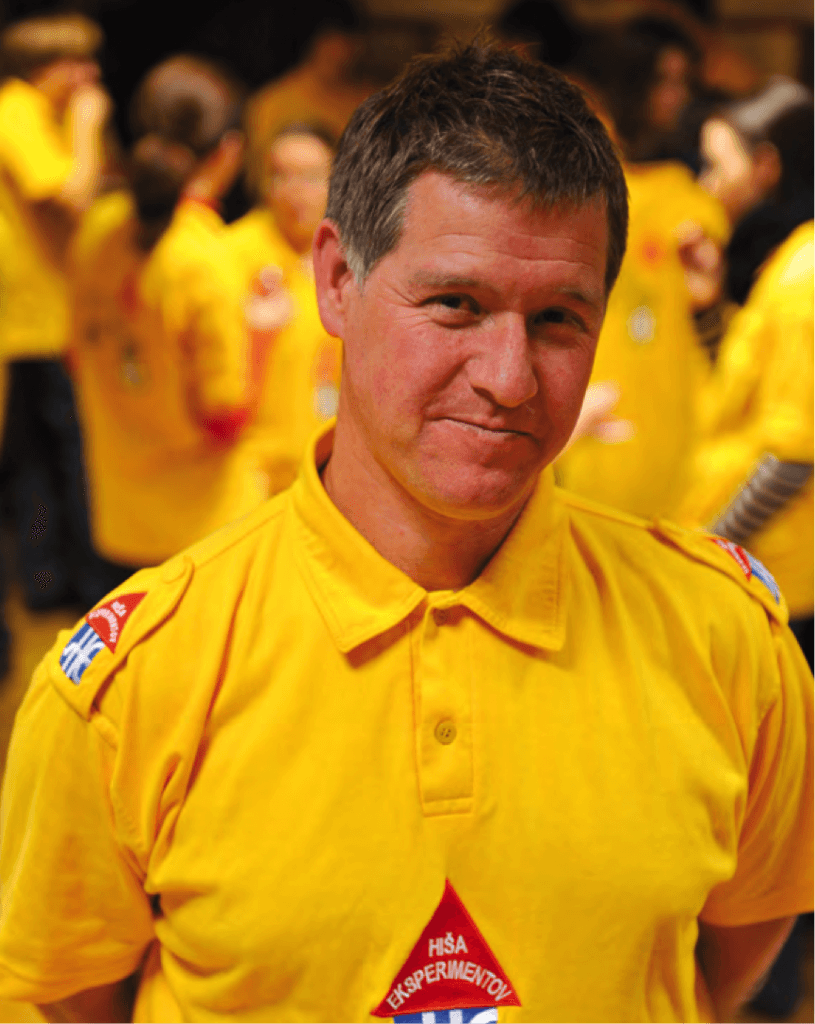
MIHA KOS Ph.D.
We talked to Miha Kos Ph.D., Head of the House of Experiments in Ljubljana. For many years he has been the ‘enthusiaster’ of the young and the not so young for science and an advocate of the promotion of knowledge and science. With a Ph.D. in physics following professional development in the United States he chose the path of inspiring other people to learn. Dr. Kos is a big proponent of the idea that knowledge belongs to everyone and is open source. Such is it also with his house experiments, with tests outside opening hours also available on the internet. From Miha we meeting organisers can also learn a lot, as he is himself attending various conferences and congresses.
Q: Your ‘Sciencetival’ (Znanstival) has recently concluded. How satisfied are you with its implementation and results?
This was the fifth consecutive Sciencetival and I am very pleased. Maybe a little less so with the weather. Sciencetival is an event that is strongly dependent on the weather. The highlight of the festival was a spectacle in which we designed a special bicycle for an equilibristic ride over Ljubljanica.
Due to this event, I can say that this year’s fifth run of Sciencetival was a big turning point in its profile. Despite the fact that we had 2 days of bad weather, there were only slightly less visitors than last year. Last year there were 14,000 visitors, this year there were 12,000 and this event gave another message: Bicycles could only be driven by older than 18 years and we thus gave a message that science or the House of Experiments, and in particular continuing education, is meant for everybody, especially the elderly.
Q: What is the mission of the House of Experiments?
‘House of Experiments’ is a nice name, very plain, but when many people hear such easy words they think this is for the kids. If the word does not include dissemination and knowledge-based society, then it somehow seems that it is not serious. We ourselves insist that we are a very serious institution for the promotion of education.
My opinion is that people only know what they themselves learn through the sweat of their brow or rather through the sweat of their own brain. Everything that anyone else has told them has gone in one ear in and out the other, or they were able to say it in such a way to impress us that we ourselves learned that we are taking things into our own hands and we actually own the things we processed. This is also a cancer of education systems around the world, as well as ours, that we have teachers … no! We should have ‘enthusuasters’, because teachers do not teach you – a good teacher inspires you to learn yourself.
Q: How do you think it is possible to encourage an interest in science?
First, you have to stimulate an interest in learning – the interest that I take things into my own hands, that you take things up and are digging deeper, looking into these questions that have arisen and that you have energy and stamina for looking for answers, that you are not happy with the first answers and you are happy to go further. It is important that you doubt the fact that new discoveries – innovations – are created only from the fact that people are questioning what exists. Thus, new things are created. If you simply believe, then you will soon grow wool over your skin and begin to “bleat”.How to impress this for science, so that you enthuse to learn, so that you show science in some way, when learning becomes fun, is through learning becoming a hobby, science here and there a game when you have already learned a lot, a lot revisited when you may have specialised and discovered something new…
For detection there is always time; very few things have been so far already discovered. A lot of things can still be found, but there are different approaches and if we look at the activities of the House of Experiments, we already provide some tools on how to impress for science. However, these are not all the tools, but if we want things to move or if we want to reach the goal, we must take the first step. [dropshadowbox align=”left” effect=”lifted-both” width=”250px” height=”” background_color=”#c9cca3″ border_width=”1″ border_color=”#dddddd” ]Humour is a kind of lever that helps to move stones in the form of problems or dynamite to help blow them up or like a spring that helps to skip them… But humour is also a very powerful tool for creating enthusiasm, something that opens people’s hearts, which opens communication.[/dropshadowbox]
Q: What are visitors to the House experiments usually most enthusiastic about?
When people come to the house experiments for the first time, they are inspired by the experiments, all of which are in turn built safely, yet strong enough to be put through a lot of hands, small hands… Then, of course, such that when someone stops to handle with them and ‘brain’ with them they are ready for a new visitor.
Q: You like to stress the role of humour as a didactic tool. How to use it in practice?
Humour is a necessary thing in life, especially if you want to get through. I take life as a series of problems. We always have problems, you never get to a situation where you do not have any problem, or if you get to such a situation already Murphy says that something is always wrong, the problem is probably in the background. It is important that problems are of various sizes and classes, we need to determine whether the problem is the size of Triglav or the size of a pebble in the sand box. And when we realise this, and when we realise that life is actually just a series of problems… when we accept it as a fact, and when solving problems slowly becomes first a challenge, then a kind of a routine, because of the challenges that we have overcome so far, we have learned something, and when problem solving becomes a hobby, then life becomes something pleasant. Maybe we are even looking forward to the next problem, because it will teach us something new … then it is easier to start solving things.
Humour is something that helps us to diminish these problems, so that we know how to grab the problem from other end. Humour is a kind of device that helps us move stones or the dynamite to make them explode… or as a springboard, which helps us to skip them … But humour is in itself a very powerful tool of enthusiasm, something that opens people’s hearts, something that opens communication.
If people, like in many countries in the world, were able to walk and smile, and smile when they look at the other fellow, life would be automatically much easier.
Q: What can we event organisers learn from the house of experiments?
Some thing which can be learnt in the House of Experiments is definitely teamwork. I think that every successful company, every successful institution, must have a successful team behind it.
One thing is the leader that someone has to be, but following discussions someone has to say let’s take this way… but the team is very, very crucial. Teamwork means that the team has as many possible colours that it can, consisting of both men and women, consisting of people of different religions (or atheists), people coming from different backgrounds … As you start to experience problems, various elements of the team will tackle the problem from different angles, which means ‘the ideal’. A team also means more listening and less talking and we will continue to think of it; what you said is also good for your colleague in another team. If this works, I think it is an open flow of ideas, innovation, since this is what gives you the energy to make your heart beat.
Q: What programmes of the House of Experiments can be prepared for closed groups?
The flexibility of the House of Experiments is important. If, of course, the event has been planned for long enough, as conferences usually have to be, and if we have enough time to prepare the topic from any theme a science show can, maybe an experiment… there is no field from which an experiment cannot be prepared, only the team must be the right one.
The characteristic of our team is that it is open. When we for example were doing an experiment in Slovenian dialects, we needed an expert in Slovenian dialects and we turned to a college from the faculty of philosophy and got Vera Smole, who is a master of this. When we worked on a geographical experiment, we again got the experts in this field… One should not do things one does not know. One must do things one knows and the saying “everyone knows everything” is a saying that applies to a team, but if we think of it as “everyone knows everything”, then this certainly will not work.
Q: How can you adapt to large congresses?
If this is a Congress with a thousand people, then they are hard to be all at once placed in the House of Experiments, at least to date. Once the appropriate house of experiments will be built – I hope it will be in this century – then we will have better spatial possibilities. But for now we can accept 80 people in the house for an hour and then serially continue to accept a large number of people. Another thing is, as I said, the science shows are our speciality, interactive adventures, or in other words ‘to jazz the science’, because it is known that if you want to play improvised music, then you must first damn well know how to play following notes. Our experts are highly trained and know how to react when they find themselves in difficult situations, and do not teach but rather inspire and, in particular, they say ‘I do not know’ when they do not know some things, as it can be the case that an expert is in the audience and will help or come up with a new idea, or the truth. Then there are certainly also workshops where from simple objects interesting wonders can be created, interesting magic…[dropshadowbox align=”left” effect=”lifted-both” width=”250px” height=”” background_color=”#c9cca3″ border_width=”1″ border_color=”#dddddd” ]Teamwork means that the team should consist of as many colours as possible, that it consists of both men and women, that it consists of people of different religions or atheists, all kinds of people, it is composed of people coming from different backgrounds. As you start to experience problems, various elements of the team will tackle them from different angles, which means is ideal.[/dropshadowbox]
Q: What about teambuilding programmes?
Science is nothing but magic that you know how to explain, and this is certainly something. We started with teambuilding activities. We organise teambuilding events in the House of Experiments for companies. For now these events occur once a month, but I think this will soon be weekly and it will be very soon 4 times a week, not more often, because we do not want inflation of teambuilding. Likewise we organise birthday parties in the House of experiments only on Fridays and only 2 birthdays a week. And because of that parents – and I’m not saying just parents, because this would be a mistake, we also had 90-year-olds celebrating their birthdays here… – in short, those who are celebrating their birthday, should, like organisers of congresses, think in advance when they have their birthday, because we are usually booked about 4 months in advance.
Q: What is your crisis advice for meeting planners?
Which companies thrive in the world? Those who invest a lot in their development. If you lag behind and think that you’re going to live forever with a product, this is a great big illusion. Your product must be refined, you must clearly examine the competition and always add extra value to your product, invent new things… and this is only possible if you have a good research team and if you have a good head of the business.
The company needs hands, needs legs, needs a body, needs nerves, needs muscles… it needs all that. It is true that in crisis situations we may be able to lose a finger and still live on… no one would want that, but sometimes it is just so. Even a fox when caught in a trap will sometimes bite off its foot to be able to come out of it… it will be of lesser quality, but still it will live on. If you’re biting off your head or if you cut it off then it is the end of the story. And that goes for the country, this applies to business and this applies to the House of Experiments. So invest in the heart of innovation in thinking, in doubt, in questions in resolving issues and in asking for advice, communication.
Q: You do not fit the stereotype of the scientist – why do you think that is?
I think I correspond to the stereotype of the scientist. For example, what is now a stereotype… a stereotype is a bad word, but I do consider myself to be a scientist, and I consider a lot of people to be scientists. Even those who have never been in any laboratory, and have never studied physics, chemistry, biology or geography. If you think, if you have doubts, or if you ask yourself questions, if you are happy to search for answers to these questions, if you are not afraid of mistakes, errors, if you are taking positive steps in your own education, if in other words you know how to learn something from your mistakes, you pose hypotheses and are checking up on them and then and are improving your life, you are a scientist.
If someone thinks that a scientist is someone that is locked up in a laboratory, someone that has at least 10 dioptres and is blending tubes and where things are constantly detonating, he or she has the wrong idea about the scientist.
Q: Is there any thing else that you would like to communicate to meeting organisers?
I think that congress programmes are always overcrowded. It is clear that one comes to the Congress once a year and then everyone wants to pass on messages on what they did, and each would like to know what everyone else did. Congresses, despite all manner of social media, email, Skype and so on, are still a face to face conversation, from gesture to gesture, from ear to ear, they are still the best way of contacting, maintaining contact and communication itself. For this reason, I always suggest as many social events at conferences themselves, starting with coffee breaks, then the areas where people can sit down where several people may sit at the same time, but not to review their e-mails, but because they found one man, be it for the common European project, or to share some ideas, either because it’s a soul mate, maybe even love… if we allow this networking at the Congress, then this is a good Congress.[dropshadowbox align=”left” effect=”lifted-both” width=”250px” height=”” background_color=”#c9cca3″ border_width=”1″ border_color=”#dddddd” ]Congresses, despite all manner of social media, e-mail, Skype and so on, are still a face to face conversation, from gesture to gesture, from ear to ear; they are still the best way of contacting, maintaining contact and communication itself.[/dropshadowbox]
Q: Could hybrid technologies replace meetings and events?
A video conference can perhaps be 10% of the event within the conference. In a video conference especially, since this is not the native language, not the natural language and often we do not really know what the “poet” wanted to say, so there may be lack of understanding, and sometimes even resentment, although all this was not intended. It is possible that there are two persons physically present on the one hand, then there are 5 on the other. These two can wink at each other, show something with hands that others cannot see, and are already in an unequal position. Therefore personally I swear on “face to face” communication.


